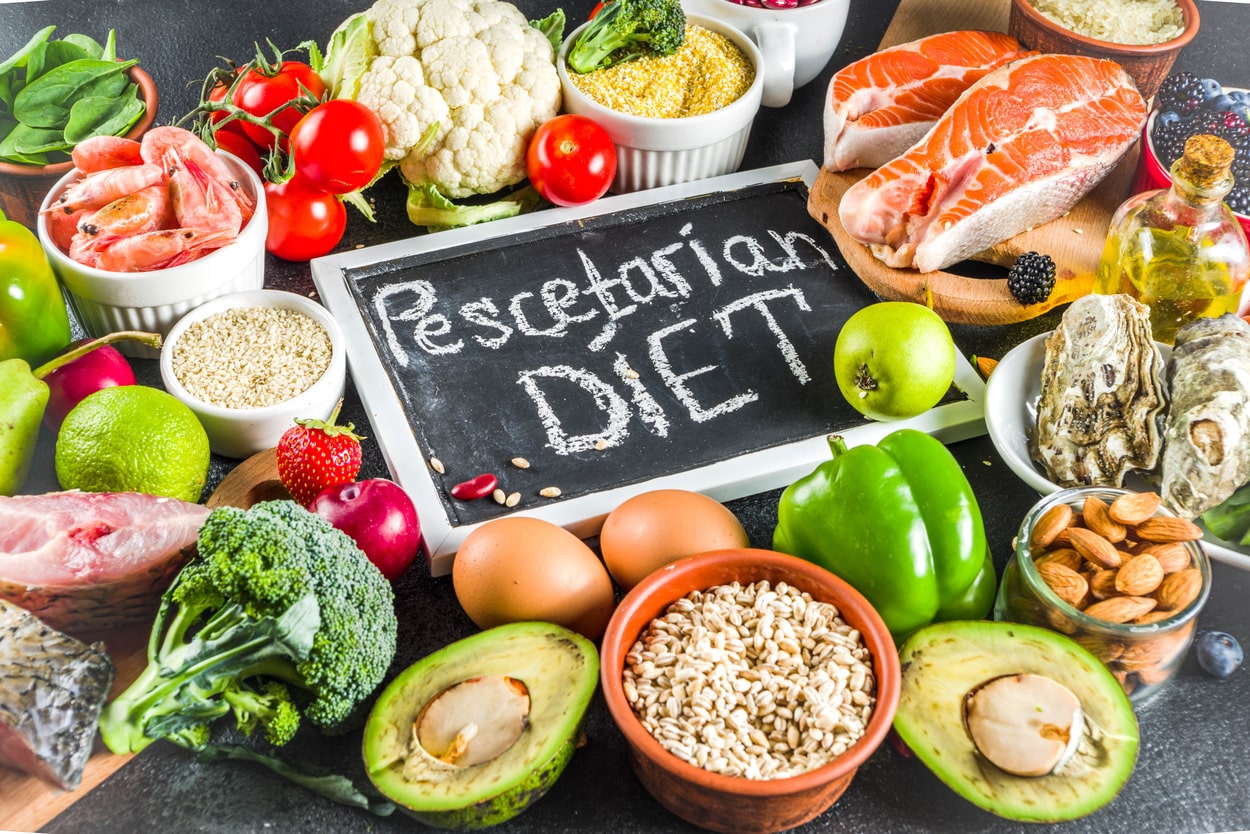The pescatarian diet is becoming a popular choice for those looking to enhance their health without giving up the pleasures of seafood. Seafood is a rich source of essential omega-3 fatty acids, proteins, and other vital nutrients. The flexibility of a pescatarian diet appeals to those who want to reduce their meat consumption without fully committing to vegetarianism or veganism. This article will examine the health benefits, recommended foods, and practical tips for the pescatarian diet. We will help you decide if it is the right dietary shift for you.
What is the Pescatarian Diet?
The pescatarian diet merges the foundational principles of a vegetarian lifestyle with the inclusion of seafood. It offers a diverse palette of nutritional benefits while often being considered a more sustainable dietary choice. This diet excludes meat and poultry but embraces fish and other seafood. That makes it an attractive option for those looking to reduce their meat consumption without foregoing animal protein entirely.
This dietary approach is not merely about subtracting meat but enriching the diet with the bountiful nutrients found in marine sources. For instance, fish is a rich source of omega-3 fatty acids, which are crucial for cardiovascular health and cognitive function. The inclusion of seafood also provides high-quality protein and essential nutrients like vitamin B12, iodine, and selenium, which are less abundant in a strict vegetarian diet. Pescatarians often enjoy a wide array of vegetables, fruits, grains, legumes, and sometimes dairy and eggs. That makes it a highly flexible and adaptable diet.
Originating in the 1990s, the term “pescatarian” blends the Italian word for fish, “Pesce,” with “vegetarian.” Historically, it is thought to stem from ethical vegetarianism, a movement that allowed the inclusion of fish as a compromise between vegetarianism and omnivorous dietary patterns. Today, people celebrate it for its health benefits and also for its lower environmental impact compared to diets high in red meat. By focusing on seafood, particularly varieties that are sustainably sourced, pescatarians can contribute to a more ecologically responsible food system.
Summary
The pescatarian diet offers a nutritious alternative to traditional meat-heavy diets by incorporating fish and seafood as primary protein sources. This diet provides essential nutrients that are beneficial for overall health and is supported by the sustainability of seafood compared to other animal proteins. Ideal for those transitioning from a full-meat diet or vegetarians looking to expand their dietary options, the pescatarian diet represents a balanced approach to health-conscious, environmentally aware-eating.
Health Benefits of the Pescatarian Diet
Let us explore the specific health benefits of adopting this dietary approach.
1. Enhanced Heart Health
Heart health significantly benefits from the pescatarian diet, primarily due to the inclusion of fish rich in omega-3 fatty acids. These fish varieties include salmon, mackerel, and sardines. Omega-3 fatty acids are crucial for reducing inflammation throughout the body. As a result, they help lower blood pressure and decrease triglycerides, which collectively help reduce the risk of heart disease.
Research indicates that consuming fish regularly can lower the likelihood of cardiovascular diseases, including heart attacks and strokes. Moreover, the diet has a high concentration of other heart-healthy nutrients from plant-based foods, such as fibre and antioxidants. That further supports cardiovascular health by improving blood lipid levels and reducing arterial inflammation.
2. Cancer Risk Reduction
A pescatarian diet is linked with a lower risk of several types of cancer, especially colorectal cancer. This benefit arises from the high intake of fish combined with a diet rich in fruits and vegetables, which are rich in vitamins, minerals, antioxidants, and fibres. These components can protect against cancer by enhancing immune function and reducing oxidative stress and inflammation, which are contributing factors in cancer development. Studies show that pescatarians tend to have a lower incidence of various cancers compared to those on a typical Western diet.
3. Diabetes and Inflammation Management
The pescatarian diet may also help reduce the risk of type 2 diabetes and manage inflammation. The omega-3 fatty acids found in fish are known for their anti-inflammatory properties, which are beneficial for reducing the risk of metabolic diseases. Additionally, the high fibre content from the plant-based components of the diet helps improve insulin sensitivity and regulate blood sugar levels.
The anti-inflammatory and antioxidant agents naturally present in both plant foods and seafood work synergistically to reduce systemic inflammation and enhance overall metabolic health.
4. Cognitive Benefits
Consuming fish and seafood as part of a pescatarian diet can also contribute to better brain health. The omega-3 fatty acids, particularly DHA, are essential for brain function and are linked to a lower risk of cognitive decline and Alzheimer’s disease. Furthermore, nutrients like B vitamins, vitamin D, and selenium found in fish can support cognitive function and mental health, enhancing memory, focus, and emotional well-being.
Summary
The pescatarian diet is beneficial for physical health and also supports sustainable eating habits. By providing a rich source of nutrients through a combination of plant-based foods and seafood, it offers a balanced approach to eating that can lead to significant health improvements. Whether you are looking to enhance heart health, reduce cancer risk or manage diabetes, the pescatarian diet presents a compelling dietary option that aligns with a health-conscious lifestyle. However, consider consulting with a healthcare provider to tailor the diet to your specific health needs.
Pescetarian Diet Weight Loss
Adopting a pescatarian diet can be a highly effective strategy for weight loss. This dietary pattern combines the principles of a plant-based diet with the nutritional benefits of seafood. This dietary pattern is naturally lower in calories and saturated fats while rich in protein and fibre, making it an excellent choice for those looking to manage or reduce their weight without compromising on nutrition or satiety.
High in Protein, Satisfying and Nutrient-Dense
One of the cornerstones of weight loss on a pescatarian diet is its high protein content, particularly from fish and seafood like salmon, tuna, and shrimp. Protein is crucial for weight management as it helps build and maintain muscle mass, which is vital for keeping your metabolic rate high. Moreover, protein is more satiating than carbohydrates or fats, which means it can help you feel full longer after meals. That reduces the likelihood of snacking on high-calorie foods between meals, which is a critical factor in weight loss success.
Rich in Fibre from Plant-Based Foods
The pescatarian diet also emphasises fruits, vegetables, whole grains, and legumes—all foods that are high in dietary fibre. Fibre aids in weight loss by slowing digestion and increasing the feeling of fullness. It helps control appetite and can significantly reduce overall calorie intake throughout the day. Furthermore, fibre-rich foods tend to be lower in calories yet nutrient-dense, allowing individuals to feel satisfied with fewer calories.
Lower in Calories and Saturated Fats
Unlike diets that include red and processed meats, a pescatarian diet is naturally lower in calories and harmful saturated fats. Fish and plant-based foods generally contain less saturated fat than red meat, which not only contributes to better heart health but also facilitates a healthier weight. By focusing on seafood and plants, the pescatarian diet makes it easier to create a calorie deficit, which is essential for weight loss. Yet, it still provides a range of nutrients to support overall health.
Sustainable and Gradual Weight Loss
The pescatarian diet encourages a more sustainable and gradual approach to weight loss. It promotes long-term dietary changes rather than quick fixes, leading to more lasting weight management. The inclusion of a wide variety of foods ensures that the diet remains interesting and palatable, increasing the likelihood of long-term adherence. Sustainability is a crucial aspect of successful weight loss.
Summary
The pescatarian diet offers a balanced, satisfying, and nutritionally rich path to weight loss. It combines the best elements of seafood and a plant-based diet. By focusing on high-protein, high-fibre foods while reducing calorie and fat intake, this diet supports sustainable weight loss and overall health improvement. As with any dietary change aimed at weight loss, it is beneficial to consult with a healthcare provider to ensure it meets all of your nutritional needs and health goals.
The Environmental Upsides of the Pescatarian Diet
Adopting a pescatarian diet not only supports personal health but also benefits the planet in several significant ways. By choosing to exclude land-based meats in favour of seafood, pescatarians contribute to reducing some of the environmental burdens associated with conventional meat production.
- Lower Greenhouse Gas Emissions: Seafood production emits significantly fewer greenhouse gases than beef, pork, and poultry due to the less land, water, and feed required.
- Reduced Water Consumption: Aquatic farming uses less freshwater than traditional livestock farming, making it more sustainable for our planet’s water resources.
- Supports Sustainable Fisheries: Opting for seafood from sustainable sources promotes fishing practices that protect fish populations and ecosystems. This includes reducing bycatch and preventing overfishing.
Summary
Adopting a pescatarian diet helps reduce environmental impacts such as greenhouse gases and water use and supports sustainable fishing practices. This choice not only aligns with personal health goals but also contributes to the health of our planet.
Nutritional Considerations in the Pescatarian Diet
The pescatarian diet melds the nutrient-rich aspects of a vegetarian lifestyle with the inclusion of seafood, providing a balanced approach to eating that emphasises health and variety. Knowing what to include or avoid is crucial for anyone considering this diet.
What to Eat in a Pescatarian Diet?
- Proteins: Include a variety of seafood, such as salmon, trout, herring, and shellfish, which are high in protein and omega-3 fatty acids. Plant-based proteins such as tofu, tempeh, beans, and legumes are also vital.
- Vegetables and Fruits: All vegetables and fruits are permissible and encouraged, as they provide essential vitamins, minerals, and fibre.
- Whole Grains: Opt for whole grains like quinoa, barley, and brown rice, which provide necessary B vitamins and fibre.
- Dairy and Eggs: Depending on personal preference, these can be included and are excellent sources of calcium and protein.
- Healthy Fats: Incorporate sources like avocados, nuts, seeds, and olive oil to ensure a good intake of unsaturated fats.
What to Avoid in a Pescatarian Diet?
- Processed Foods: Minimise intake of highly processed foods, including processed seafood products, which can be high in sodium and preservatives.
- High-Mercury Fish: Limit or avoid high-mercury fish such as shark, swordfish, and king mackerel to prevent mercury accumulation.
Special Considerations
- For those avoiding dairy, ensure adequate calcium intake through fortified alternatives or other calcium-rich plant foods.
- Be mindful of the potential for heavy metals in certain types of fish, opting for smaller, less predatory fish to reduce exposure to contaminants.
Summary
Adopting a pescatarian diet involves careful consideration of food choices to maintain nutritional balance and health. This diet excludes meat and poultry but embraces a wide array of other foods rich in essential nutrients. By focusing on whole, unprocessed foods and a variety of seafood, the pescatarian diet can meet all nutritional needs effectively. As with any diet, it is advisable to consult with a nutrition professional to tailor dietary choices to individual health requirements and goals.
Understanding the Risks and Suitability of the Pescetarian Diet
While the pescetarian diet offers numerous health benefits, it is crucial to understand its potential drawbacks and determine if it is suitable for everyone. This diet, which primarily revolves around fish and plant-based foods, may not be ideal for certain individuals due to health concerns, dietary restrictions, or personal preferences.
1. Concerns about Contaminants in Seafood
One of the significant concerns with a diet rich in seafood is the potential exposure to pollutants and heavy metals, such as mercury. Predatory fish like sharks, swordfish, king mackerel, and tilefish tend to accumulate higher levels of mercury and other environmental toxins.
The U.S. Food and Drug Administration (FDA) advises that vulnerable populations, particularly pregnant women, nursing mothers, and young children, avoid these fish to reduce mercury exposure risks. Opting for seafood lower in mercury, such as salmon, pollock, shrimp, and canned light tuna, is recommended to minimise these risks.
Read More: Best Types of Fish to Eat and Avoid
2. Nutrient Deficiencies
Pescatarians might face challenges in obtaining certain nutrients typically abundant in meat and poultry. Essential nutrients that may be less available include Vitamin B12, iron, zinc, and calcium, particularly if one limits or avoids dairy and eggs.
Incorporating a variety of zinc and protein sources, such as legumes, nuts, and seeds, and using fortified products can help mitigate these potential deficiencies. Consulting with a registered nutritionist at HealthifyMe can also ensure a well-rounded intake of all essential nutrients, especially for those who choose to consume minimal amounts of fish, eggs, and dairy.
3. Specific Population Considerations
- Pregnancy and Nursing: Pregnant and nursing women need to be cautious about the quantity and type of fish they consume. Adhering to FDA guidelines, which recommend 8-12 ounces of low-mercury fish per week, is essential to avoid potential harm to the developing foetus or infant.
- Eating Disorders: Individuals with a history of eating disorders should approach any restrictive dietary patterns with caution. Restrictive diets can exacerbate disordered eating behaviours and negatively impact mental and physical health.
- Seafood Allergies: Those allergic to seafood must avoid the pescetarian diet due to its reliance on fish as a primary protein source.
Summary
While the pescatarian diet is generally safe and can offer substantial health benefits, it’s not without its challenges and may not be suitable for everyone. Potential contaminants in fish, the risk of nutrient deficiencies, and specific considerations for vulnerable groups are critical factors to consider. Those interested in this diet should plan carefully, consult health professionals, and tailor their dietary choices to meet their nutritional needs and personal health circumstances.
Tips for Adopting the Pescatarian Diet
Adopting a pescatarian diet can be a fulfilling journey towards better health and environmental stewardship. Here are some practical tips to ease the transition:
- Start Gradually: If you are new to this diet, begin by incorporating seafood into your meals a few times a week and gradually increase as you reduce red meat and poultry.
- Explore Diverse Seafood Options: For vegetarians beginning to include seafood in their diet, start with lighter, less fishy options like tilapia, cod, or shellfish to ease the transition. Incorporating a variety of seafood can help you discover preferences and expand your diet gradually. Furthermore, it will also ensure that you get a broad spectrum of nutrients.
- Balance with Plant-Based Foods: To complement your seafood choices, emphasise fruits, vegetables, legumes, and whole grains. These foods are rich in fibre and vitamins and are integral to the diet.
- Be Mindful of Mercury: Choose seafood with lower mercury levels, such as salmon, sardines, and trout, and limit high-mercury fish like shark and swordfish.
- Incorporate Healthy Fats: Include sources of healthy fats like avocados, nuts, and seeds, which are vital for overall health and help enhance the absorption of fat-soluble vitamins.
Summary
Transitioning to a pescatarian diet is not just about adding fish to your meals; it is about creating a balanced and diverse eating plan that supports your health and the environment. By gradually introducing seafood, choosing low-mercury options, and balancing your meals with a variety of plant-based foods, you can enjoy the numerous benefits of this diet. Consulting with nutrition experts like those at HealthifyMe can also help tailor your diet to your specific needs.
HealthifyMe Suggestion
If you cherish seafood and wish to incorporate more fish, shellfish, and plant-based foods into your diet, the pescatarian diet could be suitable for you. Trying to consume enough fish, eggs, dairy, and plant foods every day to get enough protein can be difficult, potentially leading to an increased intake of carbohydrates. This comes with its own set of risks, including weight gain, a lack of protein, fatigue, and other health issues. Anyone looking to lose weight or maintain their current weight should follow a low-carb diet. It contains vegetables and fruits, lean protein sources, and an adequate amount of healthy fats, but limits energy-dense carbs like whole grains and cereals to around one handful per meal.
The Final Word
Embracing a pescatarian diet is more than a culinary change—it’s a lifestyle adjustment that could lead to significant health and environmental benefits. Whether you are drawn to its cardiovascular benefits, the potential for reduced cancer risk, or its lesser ecological impact, this diet offers a versatile approach to eating that suits many tastes and preferences. So, if you are considering a change, why not explore the potential of the pescatarian diet as a balanced, healthful, and sustainable choice?
Disclaimer: The purpose of this article is just to disperse knowledge and raise awareness. It does not intend to replace medical advice from professionals. For further information, please contact our certified nutritionists Here.
Research Sources
1. Modeling lacto-vegetarian, pescatarian, and “pescavegan” USDA food patterns and assessing nutrient adequacy for healthy, non-pregnant, non-lactating adults
2. Pescatarianism diet
3. Fish Consumption and Coronary Heart Disease: A Meta-Analysis
4. Cardio-Metabolic Benefits of Plant-Based Diets
5. Vegetarian Dietary Patterns and the Risk of Colorectal Cancers
6. Seafood Long-Chain n-3 Polyunsaturated Fatty Acids and Cardiovascular Disease
7. Flavonoids and Their Anti-Diabetic Effects: Cellular Mechanisms and Effects to Improve Blood Sugar Levels
8. Comparison of polyphenol intakes according to distinct dietary patterns and food sources in the Adventist Health Study-2 cohort
9. Fish and Omega-3 Fatty Acids
10. Healthy plant-based diets improve dyslipidemias, insulin resistance, and inflammation in metabolic syndrome. A narrative review
11. Association of meat, vegetarian, pescatarian and fish-poultry diets with risk of 19 cancer sites and all cancer: findings from the UK Biobank prospective cohort study and meta-analysis
12. Perspective: Striking a Balance between Planetary and Human Health—Is There a Path Forward?
13. Meat consumption: Which are the current global risks? A review of recent (2010–2020) evidence.
14. Connecting Mercury Science to Policy: from Sources to Seafood
15. Advice on What You Need to Know About Mercury in Fish and Shellfish
16. Have Our Attempts to Curb Obesity Done More Harm Than Good?
17. Technical Information on the Development of FDA/EPA Advice about Eating Fish for Those Who Might Become or Are Pregnant or Breastfeeding and Children Ages 1-11 Years
Frequently Asked Questions (FAQs)
Q: Is a pescatarian diet healthy?
A: Yes, a pescatarian diet is generally considered healthy as it includes a wide range of nutrients from both plant-based foods and seafood. It’s rich in omega-3 fatty acids, proteins, and essential vitamins, which contribute to heart health, cognitive function, and overall well-being. However, like any diet, balance and variety are crucial to ensuring you receive all necessary nutrients.
Q: Is a pescatarian diet good for diabetics?
A: A pescatarian diet can be beneficial for people with diabetes. It’s naturally high in dietary fibre from plant-based foods, which helps regulate blood sugar levels. Additionally, the omega-3 fatty acids found in fish can improve insulin sensitivity. However, people with diabetes need to manage their carbohydrate intake and monitor their blood sugar levels regularly.
Q: What is a pescetarian?
A: A pescetarian is someone who adds fish and seafood to a vegetarian diet but does not consume other forms of meat, such as poultry and red meat. This diet includes vegetables, fruits, grains, and legumes and may consist of dairy and eggs, depending on individual preference.
Q: What can pescetarians not eat?
A: Pescetarians do not eat red meat, poultry, or any meat products derived from land animals. It includes beef, pork, lamb, chicken, and turkey. They focus their diet on fish, seafood, and plant-based foods.
Q: Do pescetarians eat eggs?
A: Some pescetarians choose to include eggs in their diet, while others may not, depending on their personal dietary preferences. Those who do eat eggs benefit from an excellent source of protein and essential nutrients, which complement the nutritional profile of a pescatarian diet.













![Ep265: [Lean Series] 5 Ways You’re F*cking Up Your Fat Loss Ep265: [Lean Series] 5 Ways You’re F*cking Up Your Fat Loss](https://carrotsncake.com/wp-content/uploads/2025/01/IMG_3025-768x1024-1.jpg)






Discussion about this post